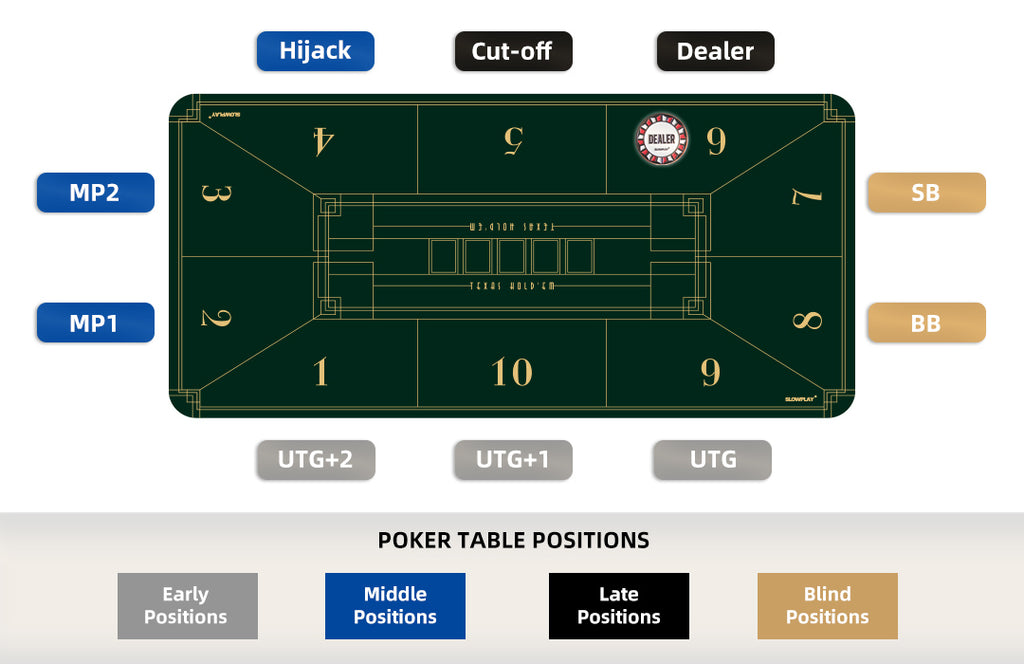Poker is an attractive game in which only limited information is given out to players. And all the players have to use their poker skills to compete with each other under the same circumstances.
Some positions at the poker table offer more advantages to players than others. By understanding how positions can affect your chances of winning, you will be able to remain highly sensitive to changes, make better judgements, and ultimately win more.
In poker, position is tied to information. Players in later positions act after players in the early positions. Therefore, they are able to make a more informed decision than those who sit in early positions. This advantage can be used by players to win towards the end of a game.
How Does a Poker Table Position Affect Your Game?

The moment you sit down at the poker table, you need to look for the dealer button. Through the position of the dealer button, you can know when it is your turn to act. The position of the small blind is the first to the left of the dealer and the big blind is to the left of the small blind. Both small blind and big blind need to start the game by betting with a fixed amount of poker chips. After that, the action moves clockwise round the poker table. Players in different positions play with different strategies. The general tip is to play only excellent hands in the early positions and good hands in the middle positions. If your hand is only average, then only when you sit in the late positions may you consider continuing with them.
What if you sit in the early positions?

The player sitting to the left of the big blind is sitting at the UTG (under the gun) position. He is the first person to act. This position is the most difficult to play, because he did not get any information from other players as a reference for decision-making. In order to make the most of this position, players usually only bet when they have an excellent hand, such as pairs with a value higher than 10.
What if you sit in the middle positions?

The middle position is more beneficial to the players, because they can figure out some effective information through the actions of first few players. In this case, more cards can be played, such as some suited connectors and tactical pairs.
If the player sit at the cut-off seat (the seat immediately to the right of the button) or the hijack seat (position to the immediate right of the “cutoff”), he can maximize the advantage brought by his position and play more pocket pairs.
What if you sit in the late positions?

Undoubtedly, this is the best position to play in the game. You have time to observe the actions of all players throughout the process. You may even have a chance to take home the pot with an average hand because all the other players fold before you act. Even if your hand is just mediocre, you can still win the pot. In the late position, there are also more diverse card choices for you to raise with. For example, as long as there is an Ace and any card of the same suit, you can choose to raise and continue playing.
What if you sit in the blind positions?

Moving clockwise, after each player completes their turn, it is the turn of the blinds to act. Now, the blind players need to check whether most of the players have bet before they decide whether to call. Generally speaking, the hand that is suitable for players in the late position to play is also suitable for the blind players. However, if players in the earlier positions choose to raise, in this situation, strategically they need to refer to what hands could be played by players in the early positions to decide whether to call. If no player raises, then they can also consider raising if their hole cards are decent.
To fold, to call, or to raise?
Are you going to fold or keep playing? If you choose to continue playing, do you want to bet the same amount of poker chips as the previous players, or raise?
In the case where your hole cards are very strong, you can consider increasing the pot 3 to 4 times the previous bet to win more chips. However, this action might also push some players with weaker hands to fold which leaves fewer players on the table.
If a player has raised before you act, then you can just call. But if your hole cards are strong, such as a pair of Jacks, A+K or A+Q, consider raising.
If no player raises ahead of you, consider raising or folding.
Now that you know the importance of position in Texas Hold'em. What do you think? Are you eager to start a Home Game now? SLOWPLAY has also prepared a guide to how to set up a home game for you. Check it out and have fun!

